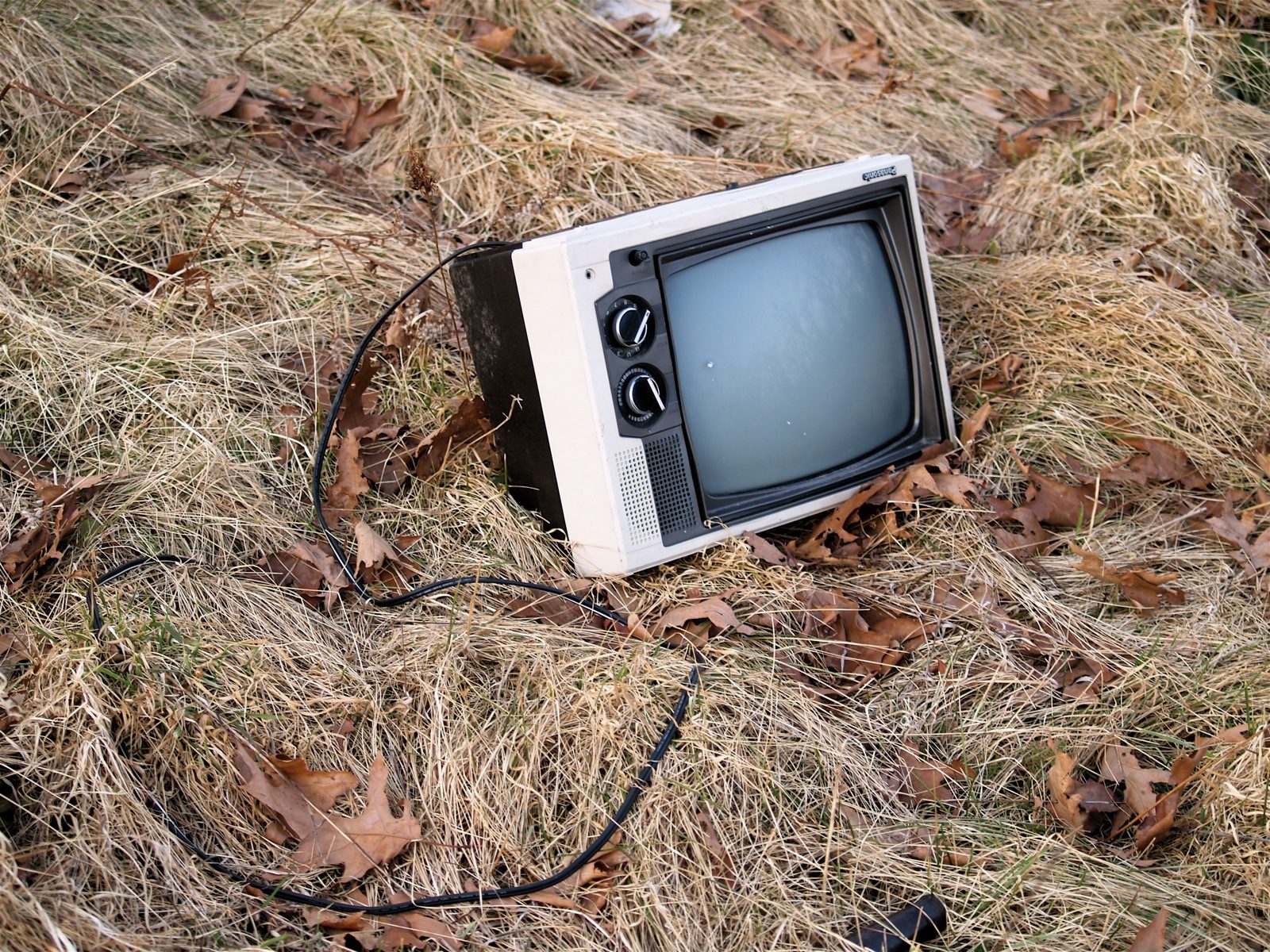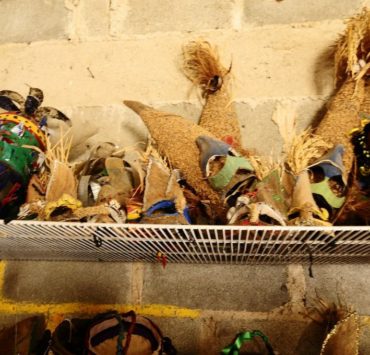
My mother and tías warn me about dating Colombian men: “Esos no sirven.” They say the same thing about the 1970s television set in our kitchen. “That TV no sirve para nada.” It doesn’t work.
As a child, I think being married to a Colombian man will be like fighting with our old television. It only gets three channels, but we make it work because it is the one we have. We switch between channels by turning the knob with a wrench. Then we spin the antennas in circles, and when one points at the sink and the other out the window— past the clothesline with Tía Chuchi’s three-dollar pants—we find it does work, and we have the telenovela Simplemente María.
Although my five uncles are in Colombia, phone calls between New Jersey and Bogotá bring stories of my charming, whiskey-drinking tíos and all the evidence for why Colombian men don’t work. From the kitchen, my mother and aunties dictate warnings that over the years come to sound like twisted nursery rhymes.
Colombian men get drunk, beat their women, cheat on their wives, and never earn enough money. They keep mistresses, have bastard children, and never come home on time. They steal, lie, sneak around, and come home to die,
cradled in the arms of bitter wives.
The same could perhaps have been said about men in other countries, but it’s easier to believe the worst about the people you know best.
At sixteen then, I know to stay away from Colombian men. I know that Julio is Colombian. But he works the grill at the McDonald’s where I have my first after-school job and he winks at me. While I know the dangers of Colombian men, I have also been reading Harlequin romance novels since fifth grade, and I have been waiting for a man to wink at me. Men do this with beautiful women, and those women are always happy. They do not work at fast-food places. They get to go to college. They speak English perfectly and French as well.
Julio talks to me in Spanish. Querida, mi amor, mi cielo. In Spanish, there are so many words to love a woman—words I have never heard before. When things are slow in the kitchen, Julio stands behind me at the register and helps me with the orders. “Ya mi amor, I got that for you. Get the next customer.”
I give him my phone number, which is to the say the number at my mother’s house.
Most women stick to their own kind. They base love and their marriages on the lines drawn between countries. My high school friends have mothers from Chile, Peru, Ecuador, and Argentine, and these mothers have married men from their homelands. Some wed there and migrated together. Others met their husbands here in Jersey among friends, at a house party, a work place. Coming from the same country was the start of connection, the entry point to love.
The women in my family do not believe in such intimacies.
My mother married my Cuban father, Tía Rosa settled with a Puerto Rican, and Tía Dora a Peruvian. They married men with dark eyes and papeles, men whose wallets had Social Security cards. Tía Chuchi never bothered with any man since everyone knows that God is the only man who truly works.
The women in my family then teach me a complicated formula of what works with men. My father’s alcoholism is better than womanizing or, worse, a man who can’t hold down a job. My Peruvian uncle is snobbish at times, but he drives a Chevrolet and takes us to Great Adventure, Action Park, and Niagara Falls. My Puerto Rican uncle is fat and has kids from a first marriage, but he reads tarot cards and cooks a good arroz con pollo for Thanksgiving. Finally, God does nothing to stop the war in Colombia, but he is reason enough for Tía Chuchi to wake up early every morning and have someone to think about other than the violencia over there and the unemployment lines here.
My mother and aunties advise me on what to look for in love:
A man with a college degree is best, but choose white over black because no one sees the diploma on the street, in churches, and at the supermercados.
Forget Caribbean men. They want sex all the time, speak Spanish with missing syllables, and if they are not black, their grandmothers might be.
Forget Central Americans. They want sex all the time, do not grow any taller, and if they are not indios, their grandmothers might be.
Consider Argentineans. They want sex all the time, but most are white, have law degrees, and if they are not Italian, their grandmothers might be.
Remember to ask if he grew up in the capitál or some no-name campo. It is the difference between marrying the Bronx and Fort Lee.
When Julio begins calling, I get under the bedcovers with the telephone receiver. My mother and aunties roll their eyes, sure that it is a passing interest. They are certain I will marry American. Anything made in America works. The cars, the washing machines, the light bulbs, even the men.
Of course, they hear the same accusation, “Esos no sirven,” hurled at Americans. They even know a woman who left her husband and children for an Americano. Months later, the gringo dumped her.
“No better than a Colombian,” declares Tía Dora, tucking a stray hair behind her ear. “He wanted her for you know what y nada más.”
But it is the Colombian men that my mother and aunties knew best. In our kitchen, they are the guiltiest.
Julio is a paradox for my family. He has hazel eyes and pale skin and looks more American than the Italians who run my mother’s factory. He calls my mother Doña and returns from fishing trips with trout for my father. My mother is suspicious; my father delighted about the free seafood.
Six months later, my tías and mother don’t know what to say. The last time a woman in our family dated a Colombian was almost two decades earlier in a country where that was the only choice. My mother gives me an accusatory look that calls to mind the writings of Achy Obejas: “We came all the way from Colombia so you could date this guy?”
I continue dating Julio, however, because I am confident in the love of the women in my family. Despite their dictates about men, my mother and aunties teach me that our primary ties are to each other as women. The four of them rely on each other for the cleaning, the shopping, the respite of a good chisme. It’s a woman who will fry you a good salty bistec, and it’s a woman, a sister, who has now pulled out the sofa bed in the living room, because Tía Rosa’s husband left and a commuter van hit her on Kennedy Boulevard, leaving my auntie in the middle of the street like a mashed-up bird. She’s been released from the hospital and has come to live with us.
In a home run by women, I hold high court. The three aunties have no children of their own, and as the first born to my mother, I am la consentida and also their American brat. National identity can carry many meanings; in our home, it is a get-out-of-jail-free card that extends to dating a Colombian man. Everyone—my mother, my tías, and even me—we blame my transgressions on my American side.
My own concerns, though, have to do with another border. I am a virgin, and Julio has said he will wait until I am ready. I expect to be ready soon.
The women in my family do not talk to me about sex, and women’s magazines do not mention poverty or race. My mother and tías tell me that men either work for you or they do not. Romance happens between seven and nine in the evening on Spanish soap operas. Sex comes later.
But at the library, I read the truth about multiple orgasms in Cosmo. I rely on a library copy of Judy Blume’s novel Forever to tell me I can have sex with a boy and not marry him. Something can happen between a broken hymen and baby showers. College and a career, of course, but mostly it will be a lot of sex. My best friend and I spend our teenage summers reading Judith Krantz novels and watching porn videos from her father’s collection. We see that women can have sex in swimming pools and hotel rooms and even on a spaceship. They can do it with different men and with each other. I observe this, analyze it, and come to my final conclusion: sex is good.
By the time I watch women have sex with each other on my friend’s nineteen-inch TV set, I have already heard about women like them.
I am ten years old and sitting at the kitchen table when a friend of my mother’s tells her and the tías the latest chisme: a woman they all know from the neighborhood has left her husband and children to be with another woman. Gasps make their way around the kitchen table where café con leche is being served.
“Can you believe it?”
“She’s that way?”
“I never would have thought it!”
Everyone is shocked that a woman was so moved by love that it flung her into the arms of another woman. I, for one, find it terribly romantic. It’s like a Harlequin romance novel but without the stoic, rich guy, or like Romeo and Juliet but without the suicides. Two women in love confirms for me that there is a love that can push you beyond what everyone else says is possible.
I am also not sure why the women in my family are so startled about a woman going off with another mujer. Besides discussing how Colombian men don’t work, all we ever do at home is talk about women.
There are two types of women in this world. The telenovela one is a fair-skin lovely who works as a maid, suffers public humiliations, and marries her well-to-do man in the last episode. Then, there is Iris Chacón.
On Saturdays, my family gathers to watch a variety show on Spanish-language television, where Iris Chacón is all sequined thong and big brown ass, and salsa is a side note. She is a curve of glitter on the screen, an exaggeration turned into art of what it means to be a woman, and we are very much in love with her. Or at least, my father and I are.
My mother and tías talk endlessly about Iris Chacón.
“Look at her tetas!”
“Qué grandes, no?”
“And her backside!
“Cómo lo mueve!”
They discuss other dancers and performers, debating who has silicone implants and fake behinds. I stare at the screen, wondering how real Iris Chacón is.
“She might as well wear nothing!” my mother declares, as if to chastise us for looking.
My father and I nod but keep our eyes on the screen, grateful that the reception is good on the old television set.
After a year of dating, I am very much in love with Julio, his old white Camaro with its muted black doors, and the tender way he kisses me. He takes me down the shore at night when the world is flooded with stars and the sound of crashing waves, and life feels so much bigger than what I ever imagined. I am seventeen and in love.
I am also beginning to resent my mother and tías for finding any fault in a man who takes me to the movies, the mall, and upscale versions of McDonald’s, like Houlihans. The more they raise their dark eyebrows and ask if Julio ever plans to attend college and amount to anything more than a fast-food job, the more I call him and tell him I will love him forever.
Sex is a different matter.
Growing up in a small town where love easily means nine months of gordura and no high school graduation, I am determined not to become a teenage mother. I tell Julio that sex between us shall happen after my high school graduation, when I am on my way to college with a four-year scholarship.
I then go about sex like the overachiever from a working-class home I truly am. First, I start taking the pill. Then, I drag Julio to the local clinic to be tested for HIV. There, I carefully read the pamphlets on STDS and abortions. I pepper the counselor with questions. I check the expiration dates on the condoms and examine the rubbers for visible signs of tears. Finally, I am ready.
Sex with a man is like what I have read in books and Glamour. There is suspense and need, an aching and much throbbing. There is el spot, and when Julio touches it, I understand immediately that this is the reason women cheat on their men, risk their corporate jobs, and abandon their children. And that Judy Blume was right, too. Something else could happen.
By the time I start wearing a fake gold chain that proclaims “Julio [heart] Daisy 2-14-91,” my mother and aunties refuse to speak to him. It only makes me want him more. At nineteen, I move in with him, setting up our home in a basement apartment while commuting to college and working two part-time jobs. I love Julio against all odds, but mostly against the wishes of my mother and tías.
When we break up a year later, Julio says my mother was right. He feared what she desired: that I would leave him for the guy with more money and a better car. Guilt-ridden, I tell him he’s wrong. The other guy understands me better. He’s also in college and a writer.
But Julio is right. The other guy does have a better car. He didn’t emigrate from Colombia and he has the money to attend college. He’s not Italian, but his grandmother is.
How did I end up heeding my mother’s warnings? Were the romance novels wrong? Does love follow the lines of race and class?
To the degree that I am disturbed, my mother and tías are delighted. Finally, I am listening to them. I am in college, living back home, working part-time at a newspaper, and dating a gringo.
The sign in the student center at William Paterson College reads: “Workshop on Sexuality for Women * Hosted by the Feminist Collective.”
I would like to say now that the afternoon, which changed my life, was cinematic. But it wasn’t. One night, I was in the arms of my new boyfriend; the next afternoon, I was sitting in a carpeted room with other college girls, giggling, fully clothed, drawing portraits of our vulvas.
The facilitator, a woman from Planned Parenthood, is genuinely cheerful and unfazed by our work. “That’s it everyone! You’re doing great!” she calls out. “Fanny, that’s beautiful! I love the colors. Keep going! We’ve got crayons for everyone! Don’t be shy.”
I glance up and down the table. All the women are drawing vulvas in startling shapes and colors and spending time on the size and details of their clitorises. So engrossed in staring, I almost don’t hear the Latina sitting next to me when she starts talking.
Fanny is the president of the Feminist Collective and she’s encouraging me to attend the group’s weekly lunch meetings. I nod politely, but I’m too preoccupied with the portrait of another woman’s vulva, which looks like strawberries that have been plucked, washed, and pried opened.
Fanny introduces me to the white woman sitting next to her, saying, “This is my girlfriend.”
Maybe it’s the rich colors of all those vulvas in one room or the slow and purposeful way she says “girlfriend,” but I understand her immediately. And as I nod at Girlfriend, I think, “I have never met one.” A lesbian.
Lesbians happen on television like Iris Chacón. They belong to another country. The idea of actually kissing a girl has never occurred to me. As Fanny and Girlfriend peck each other ever so lightly on the lips, I feel so embarrassed and enthralled that I frantically look around for a place to put my eyes. Finding nothing, I stare down at the crayon drawings of their vulvas.
What is wrong with me? Qué me pasa? Why had it never occurred to me? A girl. I love kissing boys, but a girl. I could kiss a girl. The facilitator passes by, murmuring, “Daisy, why don’t you add some colors, open it up.”
I look down and it’s there for the whole world to see: my vulva. I have drawn a small brown mound, a little hill speckled with black ants for curls.
Excerpt from, : A Cup of Water Under My Bed: A Memoir (Beacon Press 2014)
Published with permission by author.
Image Credits: Takoma Bibelot

Daisy Hernández is the author of The Kissing Bug: A True Story of a Family, an Insect, and a Nation’s Neglect of a Deadly Disease, which won the 2022 PEN /Jean Stein Book Award and was selected as an inaugural title for the National Book Foundation’s Science + Literature Program. She is also the author of the award-winning memoir A Cup of Water Under My Bed and coeditor of Colonize This! Young Women of Color on Today's Feminism. She is an Associate Professor at Northwestern University.







